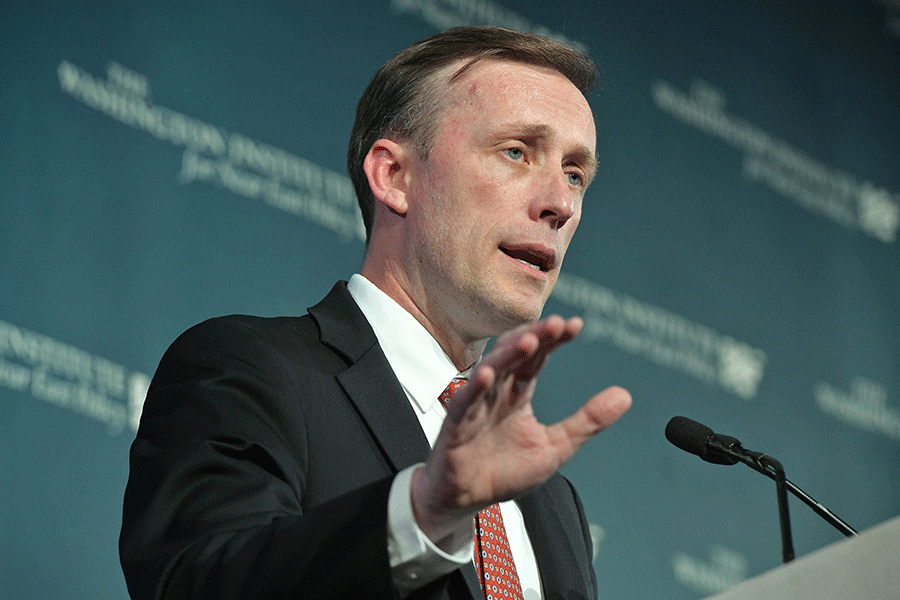National Security Advisor to US President Jake Sullivan referred to the bipartisan bill in Congress, which was approved in Senate and now is to be voted in the House during his press briefing. He said there is a reference also to the conflict in Nagorno-Karabakh.
“Yesterday, the Senate took important action to advance America’s core national security interests by overwhelmingly passing the national security supplemental agreement.
This bipartisan legislation will allow the United States to continue to support the people of Ukraine, alongside our allies and partners, as they fight every single day to defend their freedom and independence.
It will provide Israel what it needs to defend itself against Hamas terrorists and other terror threats, and help replenish Israel’s air defenses so they’re prepared against threats they face from Iran and Iranian-backed militia groups like Hezbollah.
It will provide resources for our troops in the Middle East who have faced attacks from Iran-backed militias as they continue the important mission of defeating ISIS, as well as our forces who are protecting international commerce in the Red Sea from persistent attacks by the Houthis.
The bill will provide lifesaving humanitarian assistance for vulnerable people who have been impacted by conflicts around the world. That includes millions of Ukrainians who have been displaced by Russia’s brutal invasion. It includes conflicts in Sudan and Nagorno-Karabakh. And this support also includes dealing with the urgent needs of the more than 2 million innocent Palestinian civilians in Gaza, the vast majority of whom have nothing to do with Hamas.
We are engaged every day, and directly and at the highest levels, in getting more aid into Gaza and, once in Gaza, getting it to the people who need it.
In his calls and conversations with regional leaders, the President has worked through these challenges of humanitarian assistance at a concrete and granular level in order to help overcome obstacles and facilitate a sustained, increased flow of humanitarian assistance.
Innocent civilians in Gaza have suffered extraordinary pain and loss these last four months, and we’re working around the clock to find a way forward that brings peace, security, and dignity for Palestinians and Israelis alike, with the security of the state of Israel guaranteed.
The national security supplemental agreement also continues our important investments in the U.S. defense industrial base, supporting jobs across the country. We have already ramped up production lines in 40 states over the past two years, expanding factories and hiring American workers to make the weapons Ukrainians are using on the frontline in their fight for freedom, thanks to previous funding that Congress that has provided.
The investments this bill puts forward will allow us to strengthen our own domestic manufacturing capacity, revitalize our submarine industrial base, and improve our military readiness.
It also increases support to allies and partners in the Asia-Pacific and sends a powerful message that, even as we’re dealing with immediate crises and challenges in Europe and the Middle East, we’re keeping our eye on the ball and the long-term strategic position of the United States of America in the critical Asia-Pacific region.
You heard the President yesterday thank the broad bipartisan coalition of senators who came together to advance this agreement, and he urged Speaker Johnson to quickly bring this bill to the floor of the House of Representatives for a vote. Because we know if that vote comes to the floor of the House of Representatives, it will pass on an overwhelming bipartisan basis, just as it did in the Senate.
As the President said, we cannot afford to wait any longer. Every day comes at a cost to the people of Ukraine and to the national security interests of the United States of America.
The stakes are getting higher, the costs of inaction are also getting higher every day, especially in Ukraine. We’ve been increasingly getting reports of Ukrainian troops rationing or even running out of ammunition on the frontlines as Russian forces continue to attack both on the ground and from the air, trying to wear down the Ukrainian air defenses that we’ve worked so extensively to build up over the past two years.
So, our allies are watching this closely. Our adversaries are watching this closely. There are those who say U.S. leadership and our alliances and partnerships with countries around the world don’t matter or should be torn up or walked away from.
We know from history that when we don’t stand up to dictators, they keep going. And the consequences of that would be severe for U.S. national security, for our NATO Allies, for others around the world.
And so, President Biden is determined to get this done on a bipartisan basis, through the House of Representatives, to get this aid out the door so that we are helping our friends and partners and we are helping ourselves”, Sullivan said.























































